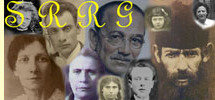

Juliusz Samsonovich Hibner
By Susana Leistner Bloch
Juliusz Samsonovich Hibner (born Dawid Schwartz) was born in
1912 in Grzymalów, Poland (now Ukraine) and died November 1994 in Warsaw,
Poland. He attended the Polish Gymnasium and also had a traditional Jewish
education. After graduating from the Gymnasium he enrolled in the Lvov
Polytechnic Institute but did not graduate. He was expelled for being an active
member of the Communist Party.
During the Spanish Civil War (1936-39), Juliusz Samsonovich Hibner went to Spain
to join the Botwin Army, a Jewish military unit that fought within the ranks of
the International Dombrowski Brigade. The Dombrowski Brigade was affiliated to
the Republican Army and fought against the troops of General Franco.
After the defeat of the Republican in Spain, Juliusz Samsonovich Hibner and
other foreign soldiers who had fought in Spain were interned by the French
authorities in France and than transferred to Algiers where Hibner managed to
escape and make his way to the Soviet Union.
In 1943 the Union of Polish Patriots (Zwiazek Patriotów Polskich) was created ,
first in Poland than by Polish communists in the Soviet Union. In August 1943,
Hibner joined the Tadeusz Kosciuszko 1st Polish Division, under the command of
General Z. Berling and was appointed deputy commander of the first infantry
regiment.
Battle of Lenino: The division was ordered to counter-attack a German force
which had previously counter-attacked the Red Army units, but had gone on a
defensive. Leading the division into battle, the command assigned it the task of
breaking through the German defense in the Sysoyevo-Lenino region on the
Byelorussian border.
Commanded by Captain Hibner, the 1st regiment launched an offensive on October
12, 1943, fighting their way across the Mereya River and occupying the enemy's
first trench, and then the village of Tregubovo.
Unknown to them the German units were reinforced during the previous night.
German fire rained down on one of the battalion's regiments causing considerable
losses. The division was forced to assume defensive positions, and was ordered
to hold its ground. Capt. Hibner was seriously wounded in both legs, but refused
to leave the battlefield, and continued to direct the attack until its
completion. Captain Hibner was the first to rise and rally his forces behind
him. This surprise attack culminated with bayonet combat, and driving the
Germans from the positions, they had occupied
The Soviet government awarded honors and medals for courage and heroism to 243
officers and soldiers of the Kosciuszko First Infantry Division and by a decree
of the Presidium of the Supreme Soviet of the USSR of November 11, 1943, three
soldiers were awarded the title of "Hero of the Soviet Union." One of them was
Captain Juliusz Samsonovich Hibner.
After the war, having reached the rank of Brigadier General, Hibner retired from
the army and settled in Warsaw, Poland.
Between 1951-1956, he was the commander of government forces, and in the years
1956-1960, Deputy Minister of Home Affairs.
Between 1960-1969, he studies and graduated with the degree of Doctor of
physical sciences and worked in the Institute of Nuclear Techniques in Swierk.
After he retired, he lived in Warsaw and Paris, where he lectures on nuclear
physics at universities.
Hibner is buried at the Military Powazki Cemetery
Sources: Various, including Polish Wilkepedia, Fundacja Antyk.
This page is hosted at no cost to the public by JewishGen, Inc., a non-profit corporation. If you feel there is a benefit to you in accessing this site, your JewishGen-erosity is appreciated.
Last updated
08/23/09 by ELR
Copyright © 2009 SRRG